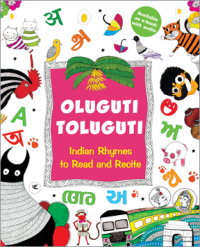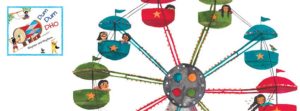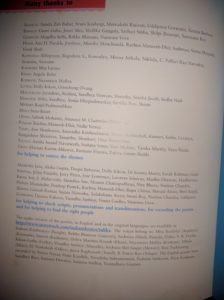“Oluguti Toluguti” and “Dum Dum Dho”: Nursery Rhymes for Children
 I recently read two wonderful Tulika Book publications. Both the volumes published four years apart are a collection of popular collection of rhymes from various Indian languages. Interestingly the first volume, Oluguti Toluguti, consisted of translations into English but with the rhymes published in the original script/ language side by side on the page and at the end the transliteration was provided in Hindi. Whereas Dum Dum Dho consists of many of the same rhymes published before but without it in the original script. In 2011, I recall hearing Radhika Menon of Tulika Books discussing Oluguti Toluguti at Publishing Next conference. Later the audio books was made available on storytruck dot com too. When Storytruck redesigned their site the simple read along format didn’t work! A large team of writers and translators worked at putting these books together. After reading the books I emailed the publishing director of Tulika Books, Radhika Menon. Here are extracts from our correspondence:
I recently read two wonderful Tulika Book publications. Both the volumes published four years apart are a collection of popular collection of rhymes from various Indian languages. Interestingly the first volume, Oluguti Toluguti, consisted of translations into English but with the rhymes published in the original script/ language side by side on the page and at the end the transliteration was provided in Hindi. Whereas Dum Dum Dho consists of many of the same rhymes published before but without it in the original script. In 2011, I recall hearing Radhika Menon of Tulika Books discussing Oluguti Toluguti at Publishing Next conference. Later the audio books was made available on storytruck dot com too. When Storytruck redesigned their site the simple read along format didn’t work! A large team of writers and translators worked at putting these books together. After reading the books I emailed the publishing director of Tulika Books, Radhika Menon. Here are extracts from our correspondence:
Jaya: Thank you for sending the books. I have enjoyed reading and comparing them. Both are extremely beautiful editions. From the notes I gather these poems were crowdsourced and you have amassed quite a few of them. So I have a few questions to pose:
- Approximately how many lyrics did you garner? In how many languages?
- Is it possible to access the lyrics you collected and did not publish?
- How did you select the poems to include in the first book?
- I recall your saying years ago that these had been released as an iBook. Is that still true? Or are these exclusively available on Storytruck?
- Why did you opt to create a companion volume of lyrics exclusively in English ? Are these books catering for two separate markets?
- One day, one day I want to hear the backstory of these books, the anecdotes about production etc. I am very sure there is a fascinating story here.
Radhika: Happy you enjoyed the books. The note on how we collected the poems is in Oluguti Toluguti*.
Oluguti Toluguti offers a culturally rich alternative. [to the popular English nursery rhymes most Indian school kids are taught] Drawn from various Indian languages, the rhymes have been carefully and skilfully adapted in English so that they retain the lively, distinctive cadence of the original while keeping the meaning and acquiring a recitable character of their own. They are selected on the basis of their popularity, their rhythmic quality, and the familiarity of the images they evoke. Thus they reinforce a feeling of comfort and confidence, invaluable for positive early childhood learning.
Sometimes the poem in English is a fragment, sometimes it is the whole. What is interesting is that many of them, although from different regions, carry similar patterns of language and imagery. And the original is never far away. In fact, it appears on the same page, in its original script, and in transliteration. A transliteration in Devanagari is provided at the end of the book.
The number of languages we collected them in have all been included. We did have several in some languages but had to struggle to get some northeast languages as expected. We don’t have the ones we didn’t include as they didn’t work or were difficult to adapt. Selection was based on the oral appeal of the poem, the relatability to an extent for readers in English and how well it could be adapted in English. Though we make it clear that they are free adaptations keeping to rhyme and rhythm rather than meaning and not literal translations (we say that in the book) there are criticisms from native speakers that the translation is wrong, unacceptable etc. That was a risk we were aware of. Can understand their discomfort too – if you have grown up with the rhymes it is difficult when the English deviates from the original. It is parents/grandparents who feel strongly about multilingualism and see the value in being able to hear the sounds of other unfamiliar languages in the English that really respond to them. Also sourcing them from different languages makes them culturally rooted in a region in a way original rhymes in English would not have been. We wouldn’t have got this plurality of characters (including animals and birds!), settings, names, sounds, food we wouldn’t have got if we had got original poems. We do get a lot of submissions and none of them appeal because they are so forced in their efforts to making it ‘Indian’! And we see the poems in Oluguti as a baby’s first rhymes – my grandsons at three months loved the sounds and my improvised actions :-).
While Oluguti works very well when used with babies and toddlers Dum Dum Dho is for the next age group roughly 3 to 6 years. In this we have included original poems in English and a few from Oluguti that fitted into this collection. Out of 45 we have 27 original ones from different writers. We included the 18 also to keep them in circulation because they are quite unique.
It is no longer on Storytruck. The way to popularise is to set the rhymes to music. Producing an audio is quite challenging – we have been trying with a couple of people and it hasn’t worked. They tend to go all ethnic which we don’t want or they make it very western rhymes like which doesn’t work either. Also the pronunciations are bad and that we can’t allow and we don’t know all languages either! Which means we need professional film or ad music directors to do it and that we can’t afford. Quite a project. But haven’t given up! Let’s see.
They are the first of their kind collections with a multilingual approach to ‘nursery rhymes’!
Here is a lovely snippet from YouTube of Sandhya Rao and Indrani Krishnaiyer reciting the title poem: https://www.youtube.com/watch?v=llF15-JL6sk
Radhika Menon and Sandhya Rao ( Eds.) Oluguti Toluguti: Indian Rhymes to Read and Recite ( Illustrated by Kshitiz Sharma) Tulika Publishers, Chennai, 2011. Hb. Rs 385
Deeya Nayar and Radhika Menon (Eds.) Dum Dum Dho: Rhymes and Rhythms ( Illustrations by Anjora Noronha) Tulika Publishers, Chennai, 2015. Hb. Rs 345
21 July 2016


No Comments